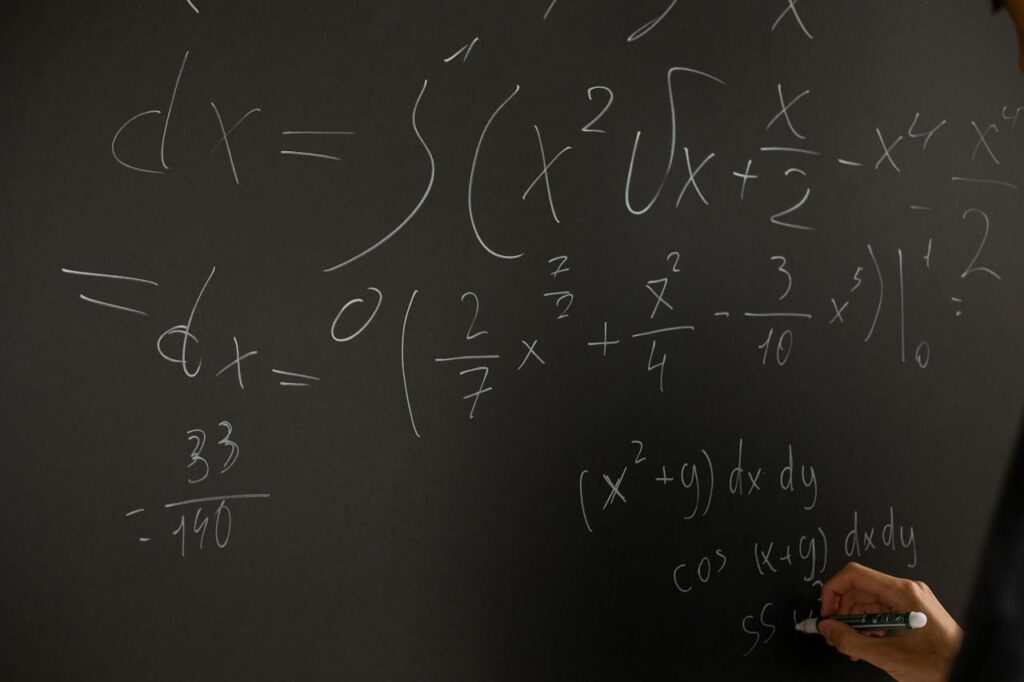Hello, IB students! Selecting the appropriate IB math course can indeed be challenging. As an experienced IB writer deeply familiar with the IB curriculum, I am here to assist you in making this crucial choice. Let’s begin our discussion on understanding IB math courses and how to determine the level that aligns best with your needs.
What Does IB Mean in Math?
In the vast and varied landscape of the IB curriculum, the range and depth of Mathematics courses is quite broad, and each varies significantly in content and rigor. Let’s clarify what is included in the IB curriculum Math. Based on my extensive experience with the IB program, I can tell you that IB offers three distinct primary Mathematics pathways:
- Math Studies is often seen as the most accessible option, focusing on practical applications and real-world problem-solving. This course is ideal for students who may not see themselves pursuing math-intensive careers but recognize the importance of having a solid mathematical foundation.
- On the other hand, the Standard Level (SL) offers a more comprehensive exploration of mathematical concepts, suitable for students who enjoy Math and its challenges but do not necessarily wish to dig into highly advanced topics.
- As the name suggests, the Higher Level (HL) is the most advanced of the three. It goes into complex and abstract mathematical concepts, providing a rigorous challenge for those passionate about Mathematics. HL is particularly well-suited for students who envision a future in fields heavily reliant on Math, such as engineering, physics, or economics.
Each course also builds mathematical skills and develops critical thinking and analytical abilities. They encourage students to view problems from multiple perspectives, fostering a deeper understanding and appreciation of Mathematics in real-world contexts.
So, what is IB in Math? It’s also about nurturing a holistic understanding of how Mathematics fits into the larger picture of the world around us, preparing students for various paths post-IB, whether in academia, professional careers, or personal growth.
Overview of Different IB Math Classes
Math Studies IB is an excellent choice for students who might not see themselves pursuing math-intensive careers but still recognize the value of mathematical literacy in their chosen fields. This course emphasizes practical applications of Mathematics, making it highly relevant for students interested in humanities, arts, and social sciences. It offers an approachable curriculum that still challenges students to develop critical thinking and problem-solving skills.
The IB Maths Standard Level (SL) is a step up in complexity and is designed to offer a balanced mathematical education. This course is suitable for a broad spectrum of academic and career paths. It strikes a balance between theory and application, making it ideal for students who have an affinity for Math but do not wish to specialize in it. The SL course covers various topics that provide a solid foundation for university-level studies in multiple disciplines.
The IB Maths Higher Level (HL) presents the most rigorous challenge for those particularly passionate about Mathematics. This intensive course covers advanced topics, including higher-level calculus, algebra, and statistics. It is specifically tailored for students aiming for careers in STEM fields or those planning to pursue Math or science-related subjects at the university level. The HL course deepens mathematical understanding and enhances logical reasoning and analytical skills.
| IB Math Course | Focus | Suitable For |
| Math Studies IB | Practical applications, basic concepts. | Ideal for students not focusing on math-heavy careers. |
| IB Maths Standard Level (SL) | Balanced curriculum, theory, and application. | Students with a general interest in math. |
| IB Maths Higher Level (HL) | Advanced topics, rigorous challenge. | It is best for students aiming for STEM careers or math-intensive fields. |
This table should help you better understand the differences between the IB Math classes and guide you in choosing the one that aligns with your academic goals and interests.
IB Maths AA vs. Maths AI
IB Maths AA (Analysis and Approaches) vs Maths AI (Applications and Interpretation) represents two distinct pathways offered in the IB Mathematics curriculum. Understanding their differences is crucial for students to make an informed decision based on their interests, strengths, and future aspirations.
IB Maths AA is more traditional and abstract, focusing on mathematical theory and developing algebraic skills. It’s heavily oriented towards calculus and includes topics like functions, trigonometry, and algebra.
IB Maths AA is ideal for students who enjoy the challenge of problem-solving and have a strong interest in Mathematics. It’s particularly suited for those planning to further education in Engineering, Physical Sciences, or Economics. This course demands a high level of analytical thinking and theoretical understanding.
IB Maths AI is more practical and data-oriented, focusing on applying Mathematics and statistics. It covers topics like statistics, modeling, and the use of technology in solving real-world problems.
IB Maths AI is perfect for students more inclined toward subjects that use Math as a tool rather than a focus, such as Social Sciences, Natural Sciences, Medicine, Statistics, Business, and Psychology. It requires students to interpret and analyze data, often using technology and software tools.

How to Choose the Level of IB Math in IBDP?
Deciding on the appropriate level of IB Math in the International Baccalaureate Diploma Programme (IBDP) can be a critical decision in your academic path. Here are some key considerations to help guide you through this process.
1. Assess Your Strengths and Interests
Reflect on your comfort and proficiency with Mathematics. Do you find Math stimulating and enjoyable, or do you see it as a necessary subject you’d instead not focus on intensely? Consider the subjects you are passionate about and how Math relates to them. For instance, higher-level might be more beneficial if you’re inclined towards sciences.
2. Consider Your Future Academic and Career Goals
Think about the fields you might want to explore in university and beyond. A higher Math level can provide a strong foundation if you’re eyeing STEM fields. Standard level Math studies may be more appropriate for careers or studies not heavily reliant on Mathematics.
3. Understand the Course Content and Difficulty
Look into the curriculum of each course — Math Studies, Standard Level, and Higher Level. Each has different focal points and levels of complexity. Higher-level courses cover more advanced topics and require a higher degree of mathematical thinking and problem-solving skills.
4. Evaluate Your Workload and Other Subjects
Consider your entire course load. High-level Math classes are time-intensive and demanding. Ensure you can balance it with your other subjects without getting overwhelmed. Balancing your overall workload is crucial for your well-being and academic success.
5. Seek Advice from Teachers and Peers
Discuss this with your teacher or IB coordinator. They can provide insights based on their observations of your abilities and class performance. Talk to peers who are currently in the IB Math courses or who have completed them. Their firsthand experiences can be invaluable.
6. Think About University Requirements
Research the prerequisites for the universities and courses you’re interested in. Some universities or programs may require or prefer a particular level of IB Math.
7. Consider Standardized Test Requirements
If you plan to take standardized tests like the SAT or ACT, the level of Math you choose in the IB can impact your preparation for these tests.
Topics to Read:
- How IB Prepares Students for University?
- Stress Management and Well-Being for IB Students
- How to Manage Time Effectively as an IB Student
- What Are the Best Apps and Websites for IB Students?
- The Benefits of Pursuing the IB Diploma Programme
- IB vs. National Curriculum. The Benefits of an International Perspective
- Can I Order the IB Internal Assessment Written Online?
- What Are the Average IB Acceptance Rates? Insights from an IB Expert
- What Are the IB Internal Assessment Deadlines for 2024?
- What Are the Average IB Scores for US Universities?
- What Are the Average IB Scores for UK Universities?
- Does an IB Diploma Help with College Admissions?
Strategies for Excelling in IB Math Courses
Now you know what is IB Math, but achieving success in such courses requires a combination of diligence, strategic planning, and the right mindset. Here are some effective strategies to help you.
Don’t let the stress of the IB curriculum hold you back.
Are you struggling to come up with topic suggestions for your IB Internal Assessment? Or do you need help with External Assessment?
Our experienced writers can help you choose the perfect topic and assist you with any assignment.
Tailored to your specific subject and requirements.
Our experienced IB writers are always ready to help.
Simply click:

1. Understand the Assessment Criteria
Familiarize yourself thoroughly with the IB Math syllabus. Knowing what topics are covered and how they are assessed gives you a clear study map. Understanding the assessment criteria helps focus your efforts on what is valued in exams and Internal Assessments (IAs).
2. Develop a Consistent Study Schedule
Create a regular study schedule and stick to it. Consistent study habits are crucial for grasping complex mathematical concepts. Allocate more time to topics that you find challenging. Regular practice is critical in Mathematics.
3. Use Diverse Learning Resources
Don’t limit yourself to just the textbook. Explore other resources like online tutorials, educational websites, and IB-specific study guides. Video lessons can be beneficial in breaking down complex topics into understandable segments.
4. Practice Past Exam Papers
Regularly practicing past exam questions is one of the most effective ways to prepare for IB Math exams. This practice not only helps in understanding the format of the questions but also in time management during exams.
5. Engage in Group Study Sessions
Study groups can be beneficial. Discussing problems with peers can provide new perspectives and solutions. Teaching a concept to someone else is a great way to reinforce your understanding.
6. Seek Feedback and Clarifications
Don’t hesitate to ask your teachers for feedback or clarification on topics you’re struggling with. Early intervention can prevent misunderstandings from becoming ingrained.
7. Focus on Internal Assessments
Give due importance to your Internal Assessment. It’s a significant part of your final grade. Choose an IA topic that genuinely interests you. It will make the research and writing process more enjoyable and engaging.
The Bottom Line
To wrap up, choosing the right IB Math class is crucial and deeply personal. Reflect on your academic goals, strengths, and interests. Each path offers unique opportunities and challenges, whether the IB Maths Standard Level, Higher Level, or Math Studies. Trust in your abilities and choose to align with your aspirations. Good luck! Also, our team at IB Writing Service is always ready to help you with assessments. You can contact us at any time. 😉




